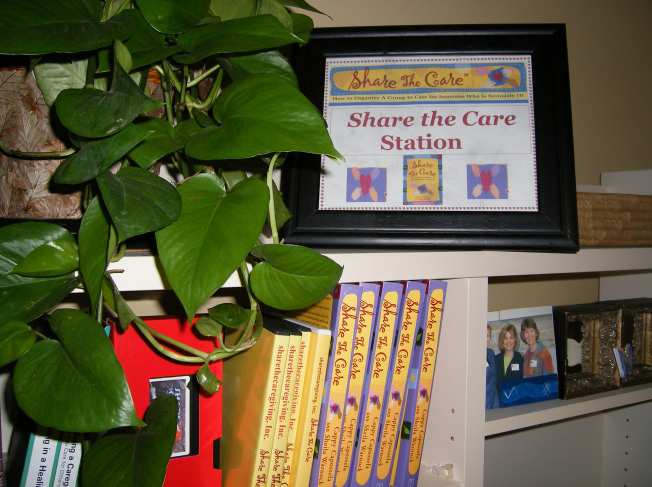EDUCATIONAL OFFERINGS
FOR YOUR NEXT EVENT…
Make A Real Difference
Let us tailor a presentation for your audience and type of event –
conference, seminar, keynote, workshop or panel.
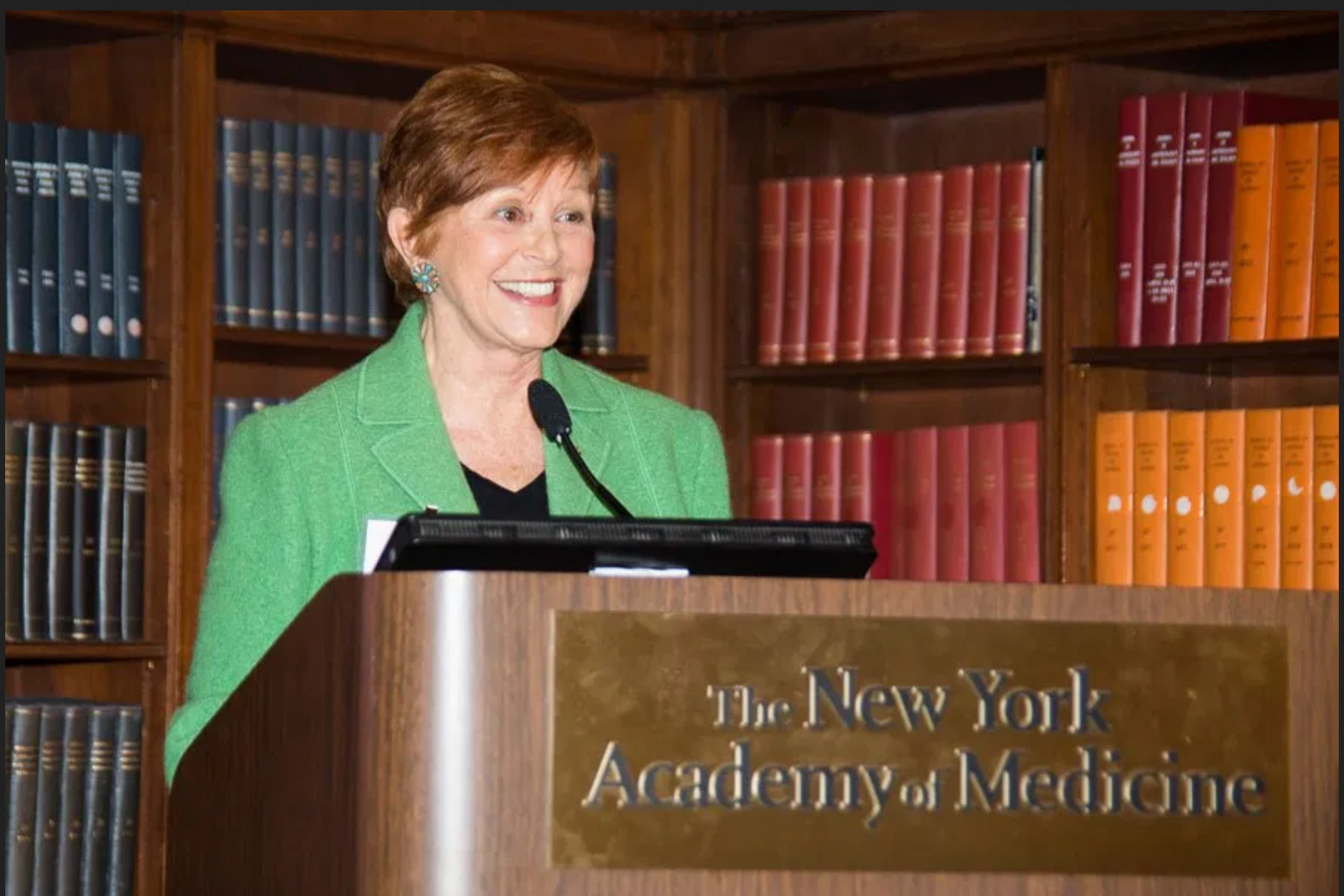
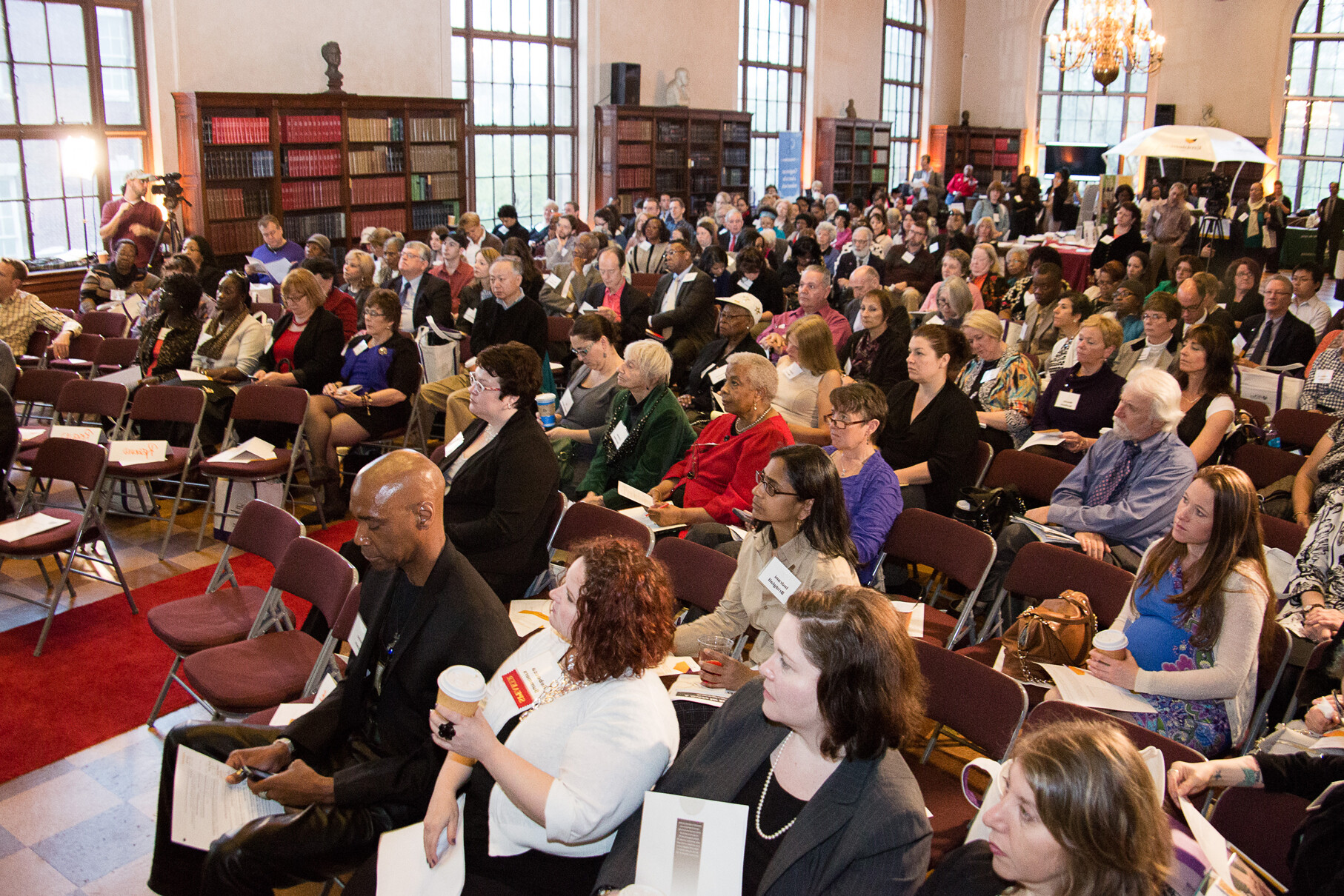
EmblemHealth’s Caregiver Conference
- Health Professional Conferences or disease specific conference
- Caregiver Events
- Faith Communities
- VA and Military Professionals, Caregivers or Clubs
- Working Caregivers
- Women’s Organizations, Clubs, Retirement Communities
- Teamwork, Community Building
STC EDUCATIONAL OFFERINGS

Saint Regis Mohawk Tribe Office of Aging, NY
Seeding STC in Your Community
“Seeding Share The Care™ (STC) in Your Community Program” is designed specifically for health professionals as well as other members of the community who work with caregivers. For example: Nurses; social workers; hospice workers; hospital discharge personnel; chaplains; geriatric care managers; aging specialists; therapists; support group program leaders; and students of social work and nursing. Volunteers who work in hospice or faith-based programs, and in caregiver support programs are also well positioned to identify needs and help people understand the benefits that can result from a created “caregiving family”.
Interested local and government organizations, faith communities, hospitals and hospices have pooled funds or received grants to host a training in order to establish the STC model locally. Examples of past programs can be seen here.
The training arms you with the tools and the knowledge to introduce STC to your patients, families, and parishioners to encourage them to consider STC as a positive and rewarding caregiving option.
This continuing professional development activity was approved by the Northeast Multistate Division Education Unit, an accredited approver by the American Nurses Credentialing Center’s Commission on Accreditation. (6.25 hrs).
Trainees learn:
- ways to motivate patients and families to accept help
- the key steps to organize a first group meeting to be lead by two friends of patient
- how groups can utilize the skills and talents within the group
- ways STC groups can maintain their efforts over time
- how a group can maximize everyone’s skills and talents
- the signals that the group needs to readjust to the changing needs of their care recipient
There is an additional cost for materials: STC books and workbooks (with 23 color-coded forms, 21 pages of handouts and more) for each participant.
For information or to receive a detailed proposal please contact: swarnock@sharethecare.org
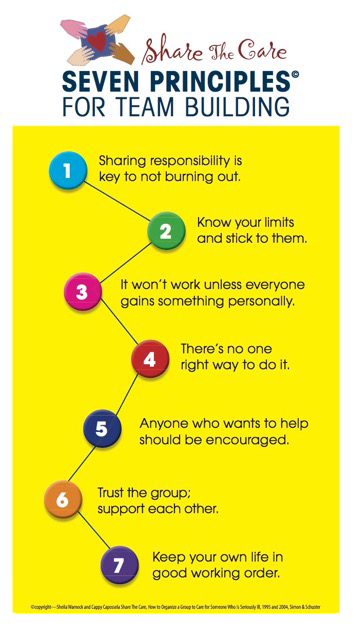
A Testimonial for Training
EDUCATIONAL PRESENTATIONS
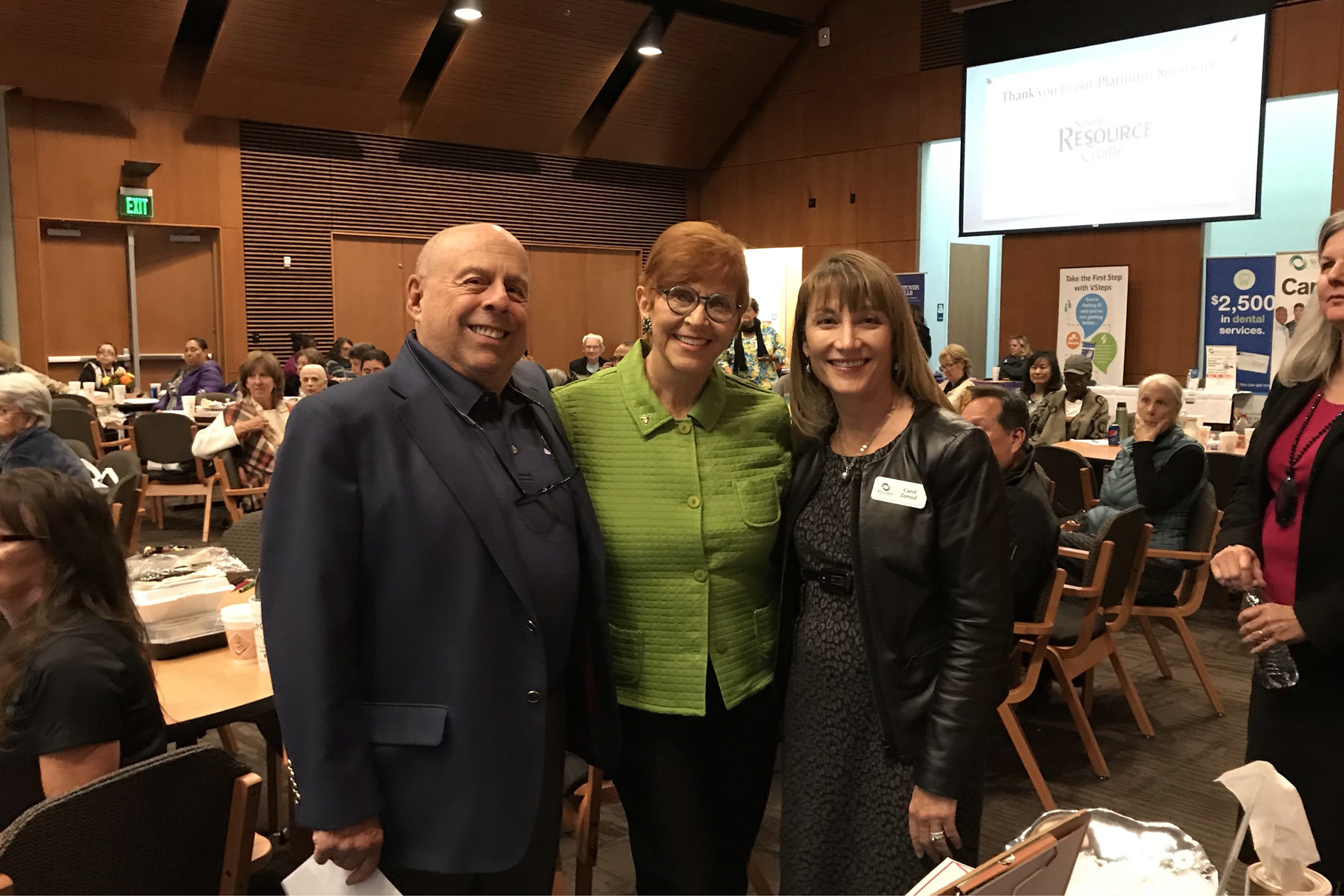
WellMed Caregiver Summit San Antonio, TX
Sheila with Caregiver SOS hosts: Ron Aaron and Carol Zernial, Executive Director of WellMed Charitable Foundation
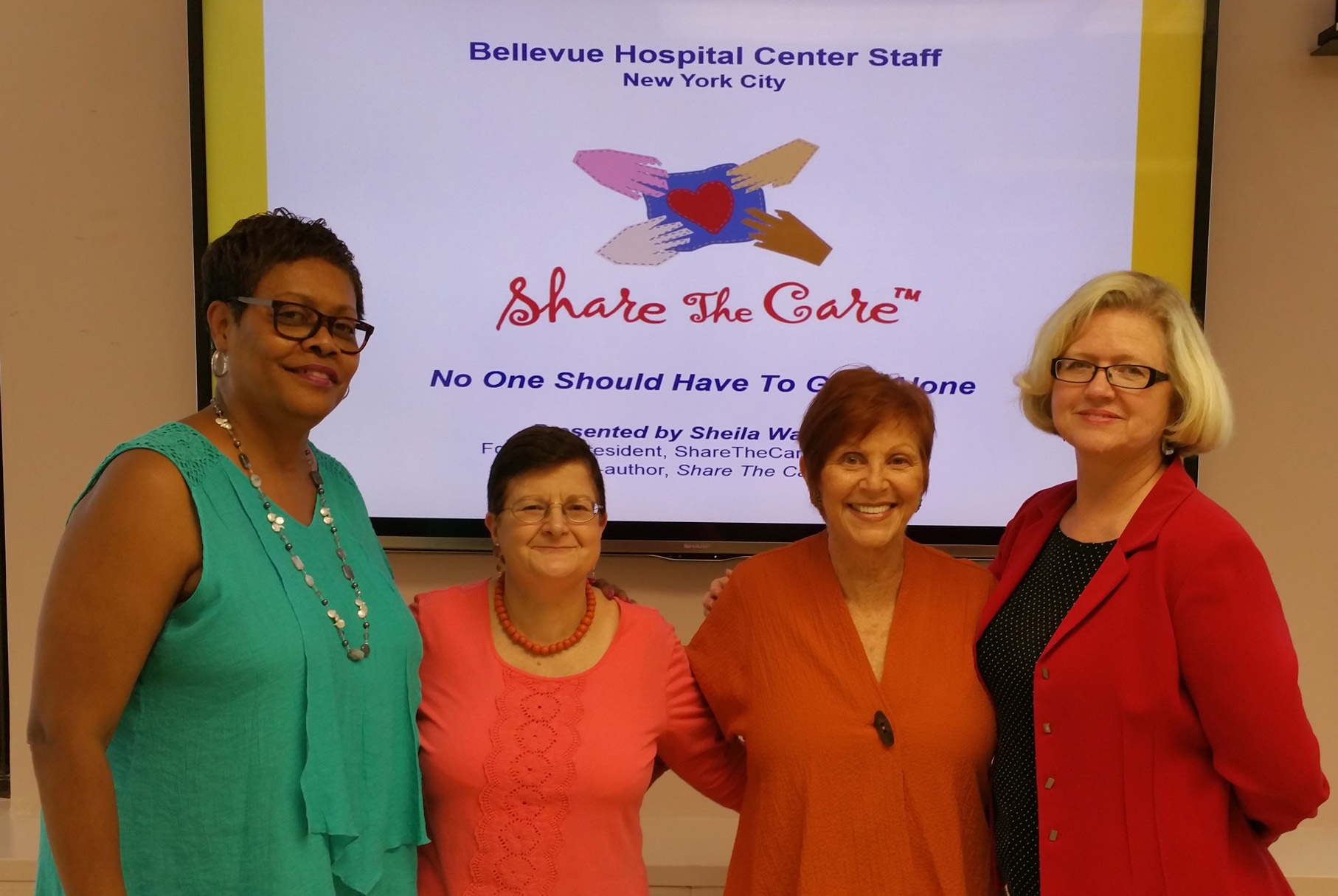
Bellevue Hospital, New York, NY
Left to right: Cynthia Burney, Phyllis Waisman, Sheila Warnock, Kim Mendez,
(Cynthia Burney is the assistant to Deputy Executive Director/Chief Nurse Executive Kim Mendez)
Who Cares for the Caregiver?
“Who cares for the Caregiver” is an overview of the Share The Care model and a rousing call to action for health professional conferences, seminars, or workshops.
As a highly regarded grassroots caregiving model, STC has been used throughout the U.S., Canada and other countries to help people who are in need of support. It was born out of the real-life needs and the experiences of 12 women (who didn’t know each other) who cared for a terminally ill mutual friend. By working closely together for nearly four years they developed a model that could support their friend as well as themselves, so no one person had too much to do and each managed to keep her own life in good working order.
Professionals will learn the first steps needed to organize the critical first meeting of a STC group and why working in close-knit teams helps maintain the group’s long-term ability to sustain their support.
During this overview of the STC model, participants learn about the key STC systems and see examples of STC in action in various communities around the world as well as their inspiring accomplishments.
(60-90 minutes) Q & A, handout brochures
How to Turn “What Can I do to Help?” Into Action
“How to Turn ‘What Can I do to Help?’ Into Action” is perfect for caregivers, concerned friends, caregiver events, conferences, support groups and the general public.
A friend tells you of a loved one’s illness. Another says she or he is caring for an aging parent. A couple faces long-term health issues with no outside support. We’ve all said it – because it’s the most universal, most instinctive reaction: “What can I do to help?” Everyone will be touched by caregiving at some point in life. What can each of us do now so that we are better prepared for our turn at bat? And how can we avoid burning out?
During this introduction to the Share The Care™ (STC) model, you’ll hear the story of how the first STC group was born and what happened to inspire the authors to write the STC guidebook so that others could follow in their footsteps.
The presentation includes examples of STC groups who have gone above and beyond the usual caregiving “call of duty” and their very inspiring accomplishments.
This presentation is about “community” at its best.
(60-90 minute) Q & A, handout brochures
Single, Separated, Widowed or Divorced –
“Who Cares for the Person Who Lives Alone?”
“Single, Separated, Widowed or Divorced – “Who Cares for the Person Who Lives Alone?” is an important topic for communities, villages and aging organizations. Today more than 31 million people live alone far from family; or they have no family. What happens when they need help? Who will care for them?
This presentation is filled with stories of groups that came to the rescue of individuals without family, or spouse, or relatives who could take on a caregiver role including within the LGBTQ community.
The audience learns through storytelling of how “created Share The Care (STC) families” have overcome some very difficult challenges. And though these families cannot cure, they can heal.
This presentations includes what it takes to start a STC group as well as important suggestions on how we can each “be better prepared” should we ever need support–no matter if we have family or not.
(60-90 minutes) Q & A, handout brochures and article by Warnock on this subject
“Let’s Get Started” A Workshop for Caregivers and Concerned Friends
“Let’s Get Started” A Workshop for Caregivers and Concerned Friends” targets caregivers, care recipients without a caregiver or friends of someone who is struggling.
If your organization or institution works with caregivers who are ready to accept a STC group but need guidance to get started we offer a special workshop. Because the initial STC group meeting is designed to be organized and led by two committed friends, each caregiver will need to enlist them to attend and participate.
Working together in little groups within a larger group, people feel more encouraged and less alone in their need for outside support. Lots of Q & A and sharing.
Following background stories and examples of what groups are capable of doing we walk everyone through each of the steps needed to organize and maintain their first STC meeting.
If a care recipient has no family caregiver – this is a wonderful way for two friends to start a “caregiving family” to support them.
Following this workshop each should leave with a plan of action and a sense of confidence and enthusiasm about accepting help.
This workshop is between 2 – 3 hours (depending on number of people.)
Materials: Each participant receives a copy of the STC guidebook and a special “Let’s Get Started” workbook to use while learning as well as 23 STC forms, handouts and suggestions. This workshop would be ideal for disease specific organizations or for programs focused on helping the caregivers of our military and veterans.
CONSULTATIONS
The STC model can be an excellent addition to any current training or workshops you provide for your local caregivers or professionals.
Let us help you make STC part of your program to make life better for your caregivers and their care recipients. Contact us to discuss licensing for a specific program.
The following are examples of successful
large-scale STC programs:
STC Initiative in SW Ontario:
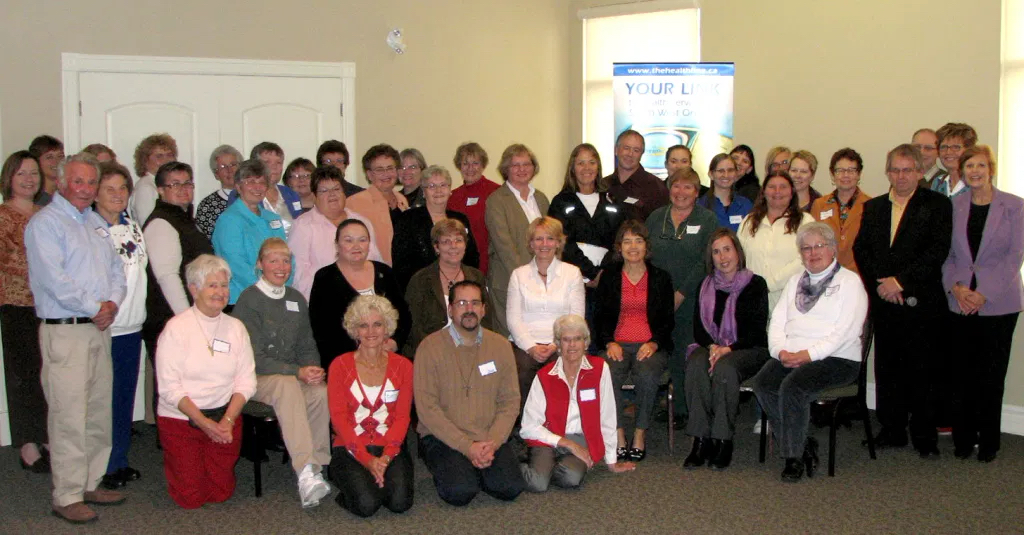
From 2009-2011 a STC Communications Campaign took place in South West Ontario, funded by the South West Local Integrated Health Network. The goal wasn’t just to spread the word about STC for two years, it was to create a well of knowledge and experience that people could draw on in subsequent years. It kicked off with Sheila leading four trainings (for over 200 professionals) and the hiring of a Canadian STC Coordinator with extensive background in caregiving.
The campaign resulted in over 100 information sessions and numerous training workshops. Even more importantly, it created a network of 40 local champions and 5 STC stations across the region. A summative evaluation at the end of the campaign revealed that 4,100 people attended information sessions and almost 7,000 information packages were distributed at various presentations, health fairs, and conferences. It’s estimated that 63 caregiving groups were formed, although the number could be higher. Most were created to support people at the end of their lives. (A copy of the Evaluation of the Program is available on request)
State of Wisconsin Programs:
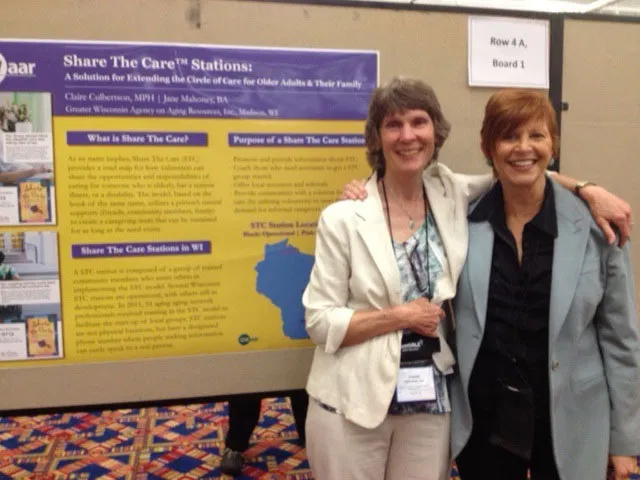
The Outreach and Education division of the University of Wisconsin Comprehensive Cancer Center, received funding from the Susan G. Komen Breast Cancer Foundation in 2001 to introduce the STC model to health professionals in Wisconsin. Claire Culbertson (above left with Sheila) was part of that team and was on a panel along with a social worker, a breast cancer patient, named Michelle, utilizing the STC model and Heidi her team member. Video above right: Observations from Care Recipient.
They made presentations at three different sites throughout the state: UW Madison, Marshfield Clinic, and St. Vincent Hospital in Green Bay. The intention was to familiarize them with the STC model and have them introduce it to their patients and caregivers. This group panel was featured in a video produced by the UWCCC (Michelle’s STC Group).
As part of the National Family Caregiver Support Program, Claire was hired to educate and train local county Caregiver Support Coordinators to establish STC Stations within the Aging & Disability Resource Centers around the state.
To launch the project, Sheila Warnock was invited to a statewide forum to introduce the STC Model. Following the initial introduction, Claire worked with county coordinators to offer STC training to local agencies that would serve to make referrals to the local STC Station. Over a 3-year-period, 15 Share The Care Stations were launched across Wisconsin.
Island of Kauai, Hawaii Program:
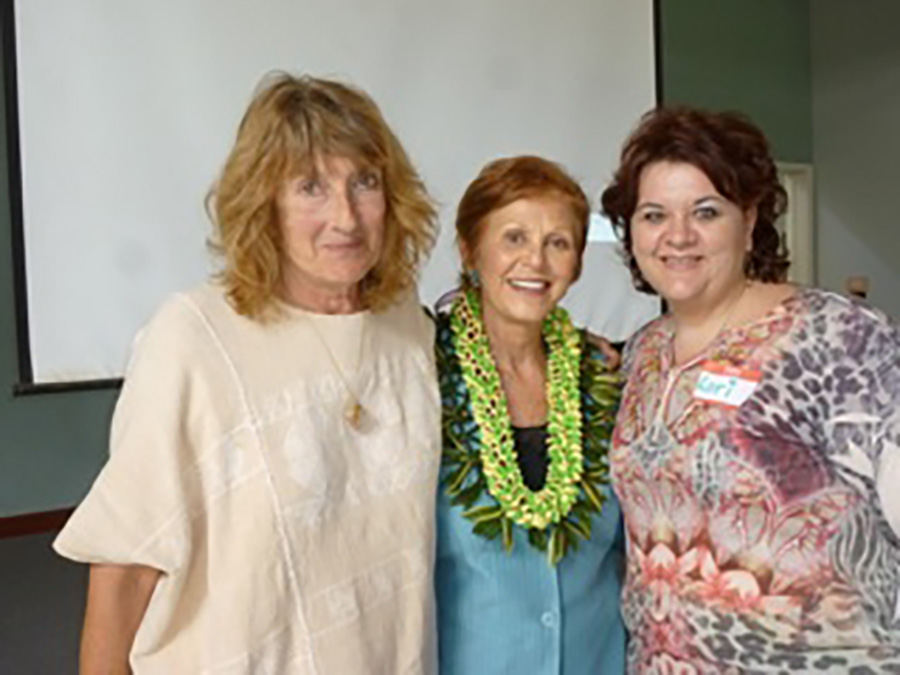
Island residents generally have small networks as grown children may have moved to the mainland. In 2012, Sheila was invited to Kauai to inspire and train 55 volunteers through Kauai Hospice. Using a customized way to apply STC for volunteers, Kauai was divided into six regions, each with a volunteer regional coordinator. When needed, regional coordinators met with families to assess needs and help organize resources – family, friends, coworkers, and faith community members – into caring teams. For caregivers without sufficient family and friends, available STC volunteers from their area form hanai – extended – families. Besides helping individual families, the STC program focused on community development and increasing resident’s sense of belonging – being cared for and cared about.
According to the program’s Lead Coordinator, Deborah Duda,(left in white) the STC program helped over 300 individuals and families on the Island of Kauai over a four-year period. Seen here with Lori Miller, Executive Director (right)
FEEDBACK FROM SHARE THE CARE™
PROGRAM PARTICIPANTS
Sample of Previous Trainings & Speaking Engagements
“Seeding Share The Care in Your Community” Program
NY State Caregiving & Respite Coalition/Lifespan of Rochester, NY
Saint Regis Mohawk Tribe Office of Aging, Akwesasne, NY
Manhasset NY-NorthShore Long Island The Stern Family Center for Rehabilitation, NY
Greater Wisconsin, Agency on Aging Resources, various locations around state
Department of VA Affairs, Pacific Islands Health Care System, Honolulu, HI
Mercy St. John’s Hospital, Springfield, MO.
Kauai Hospice, Kauai, HI
CSU at Monterey Bay, CA
Local Health Integration Network at four locations in S. W. Ontario
Hospital – Anchorage, Alaska
Wellmont Healthcare Systems/ALS Association, Bristol, TN
Sharon S. Richardson Community Hospice, Sheboygan Falls, WI
Jewish Home & Hospital-Lifecare Plus, NY, NY
Spencer Crawford Children’s Foundation, Coral Springs, FL
Area Agency for Northeastern, Area Health Education Ct. Regional Hospital, North Country Hospital, Northern Counties Health Care Inc. VT
Rutland Regional Medical Center, Rutland Area Visiting Nurse Service, Southern VT. Area Health, VT.
St. Vincent’s Hospital – ShareTheCaregiving NYC, NY
